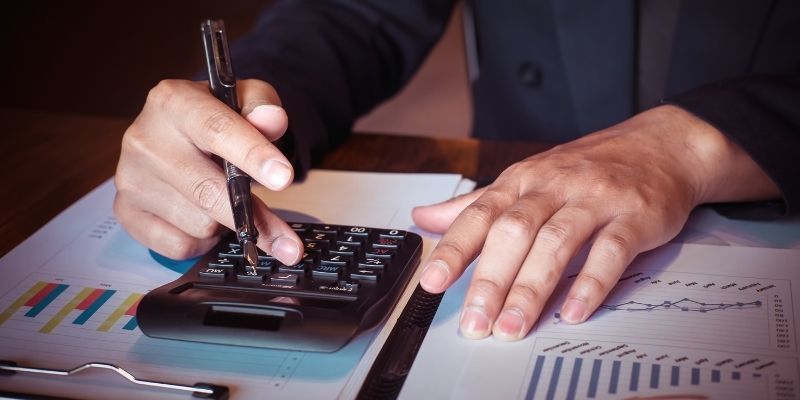Facing Your Fear of Maths with Functional Skills
We all have subjects that we are naturally good at. Some people have an excellent way with words and take like a duck to water when studying English or subjects that heavily rely on the use of writing and speaking with effect.
Others are great with Geography, and the History buffs among us will no doubt shine when it comes to studying Politics, Archaeology or Art History.
However, unless you are one of those people who are annoyingly good at everything, you will no doubt have subjects that don’t come so naturally to you. For many people this is Maths.
In fact, having a fear of Maths, or a Maths phobia is so common that it causes a real problem for many individuals throughout their lives. This is a global issue, but studies have shown that UK students are the most anxious about Maths and that this anxiety tends to start in the first few years of school.
So, what can you do? Do you ignore it and avoid mathematical equations at all costs? Do you look for free Maths courses to try to get around the issue? Or do you take a more structured approach to face this fear of Maths once and for all?
We look further into the reason why people hate Maths, why it’s necessary and what you can do to boost your Maths skills quickly and get the qualifications you need to progress below.
Why Do People Hate Maths?
Maths Teachers will tell you that the most common cry from students is “Why am I learning this? I’ll never use this again.”
This can be followed with, “I want to be a [insert job title here], so why do I need Maths?” More than likely, the subtext here is “What is the point of Maths?”
With the traditional way Maths is often taught in schools, it can make it appear overly complicated and unnecessary, so it is no wonder students feel like this. So many of us describe ourselves as not being ‘a Maths person’ or being ‘rubbish at Maths’. If Maths in school continues to focus on complex and seemingly unrelatable equations, instead of real-life problems, this thought process will continue.

With equations like this floating around, it’s easy to see where this fear comes from:
(a1 + b1i) + (a2 +b2i) = (a1 + a2) + (b1 +b2)i
Do You Actually Need Maths for Most Jobs?
Psychologically, we can develop a fear of Maths, but practically speaking, not having mathematical qualifications can hold us back too. Ok, we’re not all going to work for NASA, let’s be honest, and we don’t really need to understand algebra to work in retail. Not having advanced mathematical skills also won’t hold you back if your dream is to become a Beauty Therapist, or get qualified to become a Nurse.
Yet, later in life, in our careers, we are most likely to use Maths all the time without even realising. You might think Maths is far removed from hairdressing, beauty therapy, catering, automotive painting and health and social care, but you would be wrong.
Maths Can Creep Up on You
You can do your best to avoid it, but Maths can crop up in unexpected places, like in a salon, for example, a car garage or at the hairdressers. Ratios are a classic example, they’re everywhere!
Ratios are quite simply how much of something you need in relation to something else. An everyday example would be one part squash to four parts water, or one scoop of baby formula to two parts water.
We are all used to using these types of equations, which is a prime example of how we use numbers and ratios on a daily basis without perhaps realising. They are in every cocktail we make and every recipe we follow! These Maths examples would simply be written as 1:4 (squash to water) meaning ‘four times the amount of squash you have to water’, or 1:2 (baby formula to water). Simple, right?
Do Beauticians Need Maths Skills?

Bad hair day? What does that have to do with Maths exactly?
You may be surprised to hear it, but Hairdressers actually use Maths every single day. One great example of how is to stop your highlights from going too brassy, to prevent this, your Hairdresser will calculate how much colourant to use for the hair tints.
While Hairdressing might be a far cry from your future career, it shows just how commonplace Mathematical obstacles are in everyday life and your career. Another example that’s far removed from the hairdressing industry would be if you work in automotive painting. For this, you will also need ratios to mix paint.
Prime example:
Single stage paint = 8:1:1 in main paint, reducer and hardener
These ratios may appear to be relatively straightforward, but what about when a client has longer hair, or you need to calculate the amount of paint for the size of the car? Would you feel confident making these calculations on the spot?
In salons, retail and beyond, the following elements are all part and parcel of the job:
- Timings
- Schedules
- Appointments
- Fractions
- Percentages
Shape, space and measurement, another key part of applied Maths, will also feature in jobs in construction or when you’re renovating a house.
These Maths skills are nothing to worry about though, as a Functional Skills Maths course gives you a swift and convenient way to overcome your fear of Maths and face these situations with confidence.
Take a Different Approach
What students were likely really asking for when they complained to their Maths Teacher was another more relatable way of learning Maths. If the mathematical equations you are working on relate to everyday situations, it will be less likely that you will break out into a cold sweat every time someone mentions ratios and proportions. Or when you’re figuring out how much a 20% voucher gives you off the total price.
Functional Skills Maths Courses
When it comes to learning Maths, most of us just need real-life examples and decent explanations for the lessons to sink in. This is what Functional Skills qualifications were developed for; to put Maths into real-life contexts so it is relevant to us all.
Learners for years have been searching for a simpler way to learn Maths and other key subjects like English and ICT in a way that actually matters to them. It is no surprise then that Functional Skills Level 2 courses are Ofqual’s most popular qualification after GCSEs.
When studied at Level 2, Functional Skills courses provide GCSE grade equivalents at a C/4. As such, employers like Functional Skills Maths Level 2, Functional Skills English Level 2 and Functional Skills ICT Level 2, apprenticeships also require them to enrol.
Also, because Functional Skills courses are based on real-life mathematical examples, you will graduate from your Functional Skills course with the confidence and practical skills to tackle numbers and solve problems. You can also study Functional Skills Level 2 courses online, at your own pace too.
By studying Functional Skills Level 2 Maths online training courses, you will have the skillset required to handle all the situations mentioned above and more.
Check out our FAQ on Functional Skills online training courses to find out more and finally face your fear, it isn’t that scary after all!
Enrol Now
So, rather than ignoring your Maths phobia and hoping it goes away, you can get back into the swing of studying Maths with free Maths courses ahead of completing Functional Skills Maths studies that will give you that essential structured learning. Functional Skills Maths courses provide you with a quick way to get the Maths skills you need for everyday life, and a nationally recognised Maths qualification.
Distance learning providers like learndirect offer you the opportunity to face your fear of Maths from the comfort of home. This appeals to learners who perhaps don’t relish the idea of studying in a class with others either or those who perhaps classroom education isn’t an option at all.
Find out more about our online training courses in Maths, and the other Functional Skills courses we provide by contacting our Course Advisors now on 01202 006 464 or contact us online. Alternatively, you can click below to view these in more detail in our FREE Functional Skills Course Brochure!




















